Quote:
Originally Posted by mollydog

Not all BMW riders can do this. For them, maybe a Jap bike is an easier deal?
Suzuki, and most Jap bike companies, have about 10 tens more dealers world wide than BMW. So if you get in trouble, dealers are everywhere in many countries.
|
You can get help from any tech or car shop anywhere in the world on most cases, there isn't much need for a speciefic dealer these days. DHL, Fedex etc works max few days package delivery all around the World to get your parts ordered from the "civilized world".
All this moan about reliability, brakedowns, where to get help, dealers, etc etc sounds like people are going just a way too paranoid these days. No wonder why we still have wars going on the Earth.
So if your Suzuki's blows up and engine completely mechanically seizes in the middle of nowhere, so what? You'll die soon after on the spot because of that?
This can happend on any bike. Doesn't matter if there's written BMW on it, or Honda or a HD, doesn't matter if the bike costs 500$ or it costed 500,000$ for you, nothing is mechanically perfect.
I tend to think people miss the sense of adventure these days and massivly trying to model illusory stability and social well-being they experience in their everyday lives (a stable "home-work-home" route) onto adventure travel and assuming the same philosophy should apply there as well, with no surprises coming up, a static system, assuming that all goes as expected and is 100% safe. Then better get a tourist spa package to Hawaii!
I.e. compare the travel stories done in the 70-80s on BMWs or Enfields or even HDs into third-world, lot of technical problems, no dealers around, but that's what makes it interesting. Compare them with dozens of modern date travel stories where not much happends.
Remember the good old sayings:
"Adventure starts where things start to go not as planned."
"Travel is galmorous only in retrospect."
What do you want to remember in your old age if you've done only short travels where the bike worked 100%, just another boring travel story to remember, or is it ultra-interesting somehow for you to read the same stuff all over again?

As Grant sayed: it's somehow really good if you brake down in the middle of nowhere, you get to know locals while you order your parts and work on the bike. A chance for a real contact with the locals that you don't experience much on "regular" travels. There's a thing to remember and write in your travel book! Think positive!
What I'm simply tring to say here is that there's no definitive truth about machine's reliability versus travel. I think most of current date bikes are realiable enough to get you anywhere in the World or multiple circles around it if your really want it, possible even on a 50cc scooter. And from this point of view, on chooshing the bike it's better to focus on the character of the bike rather than abusing your brain with the dogmatic information of 'realiability' going around in the internet that only makes people more paranoid. So the question is: do your really LOVE to ride THIS bike?
Yes?! Then pack up and go! Enjoy!
Quote:
Originally Posted by mollydog

the new CANbus system and fuel injection. What do you think?
|
I'd stop moaning, japs will soon have a similar system and then you start to think it's "normal". Time goes on and listening only Mozart doesn't bring on the evolution much. BMW has made the first step forward, they have guts to do it as we know and they can suffer the "teenager" consequences as well being the only real tester of the new system.
Japs will proabably just copycat it later when it works convincingly.
I think diagnostics equipment you can carry on the road is pretty effective on the current date, and will be much more in the future. If they catch up, a small compact diagnostics computer that fits into your pocket, you can take on the road, then the hassle with the electrical issues like on the current regular wired bikes will belong into history.
So I think the direction the BMW is going is positive and I'm pretty sure it's the future of bike's electrics, others will follow sooner or later.
Quote:
Originally Posted by mollydog

I've stopped checking my valve clearances now at 54,000 miles. The valves simply do not move. Suzuki reccomend a check every 12,000 miles. I think BMW say 6000 miles? The Vstrom, like all Suzuki's, uses same oil for engine and gear box. Seems to work quite well. Do you think your BMW shifts better than my Suzuki?  The Vstrom does not shift that well compared to most Jap bikes but its still better than most BMW's, even the new 1200's. |
What's the point of ultra-smooth shifting when it shifts smooth enough?

What I really like about the boxer twin engine is the pulling power starting from VERY low rpms, @2K there's already decent pull for a fully loaded bike - thus I need to shift very little, most of the city I can ride through in 3rd gear.
If it was a racing-sportsbike with some 15Krpm redline with gears having very small differences and whole day you need to kick up and down gears in a fraction of a second then yes, ultra-fast shifting would be required. But it's definately not my cup of tea for riding long rides, I prefer lazily low revving "torquey" engines with few gear changes, especially on travelling I find it to be a very good pro for a long distance bike.
With my bottom end, I haven't yet experienced any similar displacement bikes that pull so well start from the idle as R1xx0 boxers do.
And this is the character I really like on the bike on travelling and every day communiting, makes a grin in my face.
Most rivals toast the R1xx0 engine from high revs like a toy but again it's not my cup of tea and I'm thankful BMW has optimized their engine for the real life conditions not following the peak horsepower specs run to be in the competition with others for the 'biking n00b market' that only look on the paper on deciding which bike to buy - I rarely go near to the redline on travelling and the sweetest part is the mid-revs that I use the most every day and where I really like the character of a boxer engine. The redline is already @7.5K, for a 1080cc twin it's quite a respectable spec, I personally much prefer it over the screaming bikes that most of similar capacity v-twins and inline multis are nowadays (i.e. only 80cc smaller V-Strom's redline is much higher @9.5K). Different strokes for different folks.
While everyone seem to run towards to the peak performance spec (which means more revs) I'd like to go to the opposite direction. Couln't imagine travelling with a 18,000+rpm revving F1 engine on a big trailie bike... Pointless.
I've always fancied about lightweight (for a) diesel big trailie too, with some 4K redline and loads of torque right up from the idle, shaft drived of course. Would make a fantastic bike for my needs.
Quote:
Originally Posted by mollydog

At 54,000 miles my Vstrom still uses almost NO oil. Can most BMW's say the same? I have travelled with many BMW riding buddies for over 20 years. Even
the new oil heads are using quite a bit of oil, some like a liter in a 1000 miles.
Not all of course, but many do use some oil. Why?
|
There is some truth in it in some way. All bmw oilheads R850/1100/1150/1200 have VERY stiff oil rings, it takes at least 30,000kms to run them in, the practice has shown. Newer bikes haven't reached this mileage and they do take relatively lot of oil especially when the bikes are very new. From first 1000kms I think there goes even 0.5 to 1 litre of it, that's what i've heard. Oil consumption stops around after 30,000kms, I've experienced it on my both R1100GSes. On my 17,200km expedition to Iran and back (w/o no maintenance at all on the bike) it took exacly 1.5 litres of oil, which does 88 millilitres per 1000 kms and I consider this to be a trusty spec for an air-oil cooled engine going through Iran and Turkey's summer weather in the heat boom (+35 to +45C sauna). I wouldn't trust the bike that consumes no oil at all per very long mileage, I'd doubt this kind of bike works in a long term. Think how big the mechanical movement is in the engine and how much lubrication there is needed. As a side note: my Suzuki I4 took about the same amount of oil using only quality full synth oils made for wet clutched motorcycles.
Note that on GS I use the cheap semi-synth oils I can find from car shops. Using quality oils reduces the consumption considerably on boxers.
Stiff oil rings come as pro later on. There's lot of oilheads with 300K+ mileages with NO top end overhaul done and the oil consumption and the compression are within specs. So the top end's resource of the engine is excellent for a big capacaty twin. I also know an older airhead with over 300,000+km on the clock and uses no oil if using high quality Castrol synthetic, thus the consumption also depends lot of the quality of oil.
As Ali Baba put the picture with 450,000+km done R1100GS, there are many of them very high mileage capable.
One of the reasons for additional oil consumption is the boxer concept itself actually - using side stand regulary can increase the oil consuption. Reason is there that using side stand puts one cylinder head above the horizontal axis, and if the engine stopped in the crank position leaving "bottom" cylinder's exhaust valve open means that a small gulp of oil left from the last stroke will flow into exhaust. It's considerably reduced on the new oilheads tho (if you remember the smoking airheads in the morning after they've been left on the sidestand for a night

), but it's still there, it's a "feature". That's why you see many boxer bikers use centre stand mostly rather than side stand for a night stay.
Hope this explains it.
Quote:
Originally Posted by mollydog

Tell us more about your travels Marcus. Is it expensive to tour in Eastern Europe?
|
OK, some offtopic for the relief then. Baltics: it's cheaper (fuel, food, accom, ...

) than most of western Europe. Also for the big trailies it's an ideal playground - lot of gravel roads you don't see everywhere in the western Europe, and also the main tar roads are very shaky.
Currently it's like this here, winter:
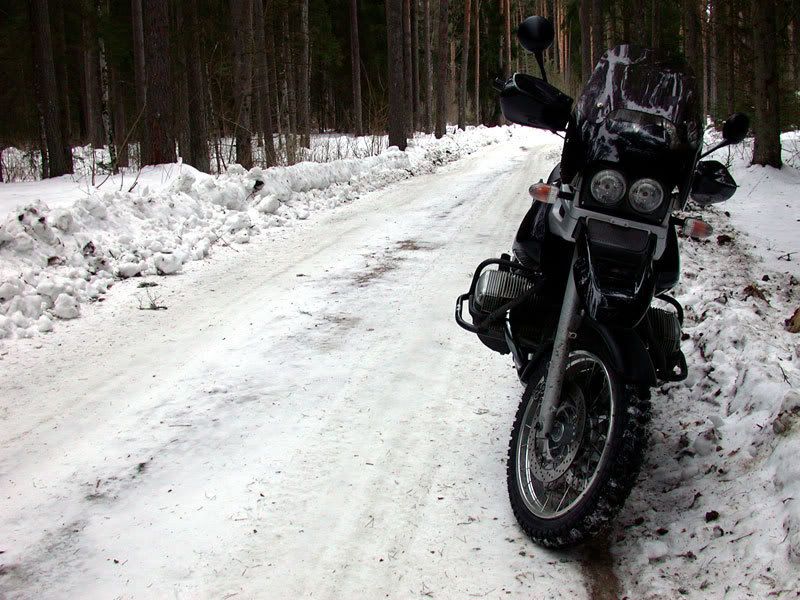
But we have also warm summers, riding season is around 7-8 months.
Lot of gravel with some nice straights to test your bike's stability and top speed on the loose surface

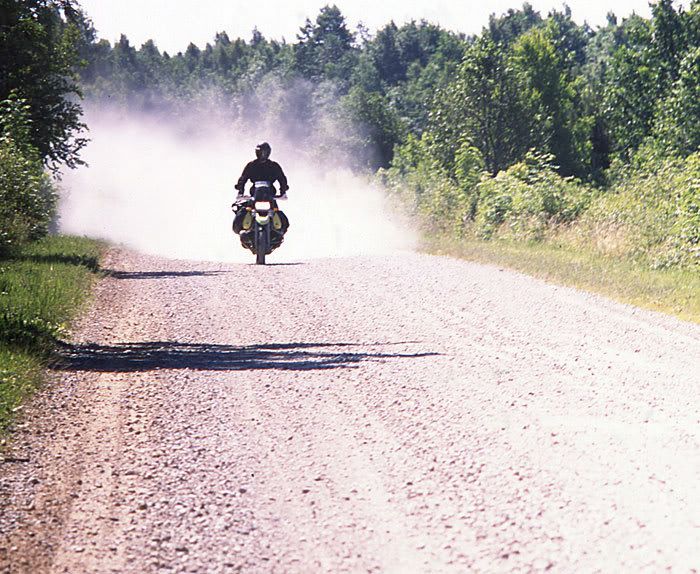
And if you look for enough then you can find a footpeg scratching tar too:

(warning: don't try this at home, like I did with 1 hand only!)
But certanly many roads aren't that overcivilized, which is good for your riding skills:
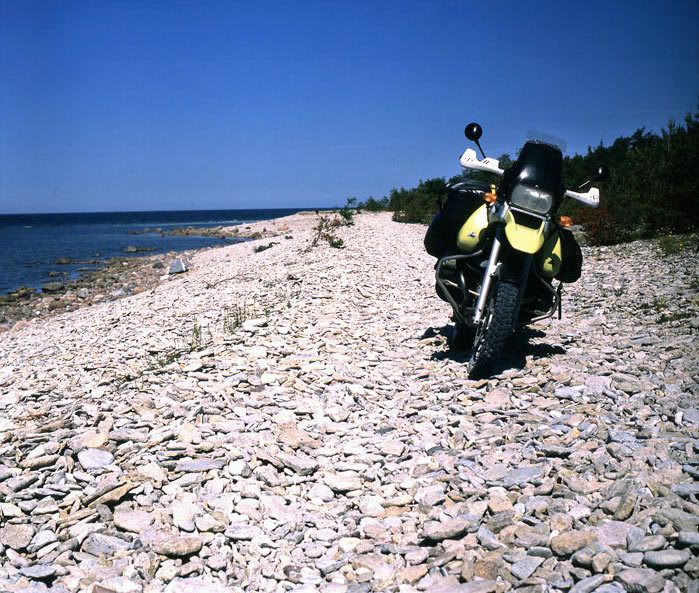
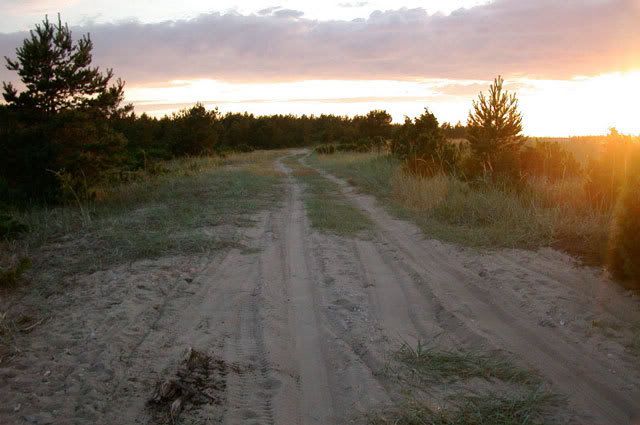
Shaft drive comes in really handy often:
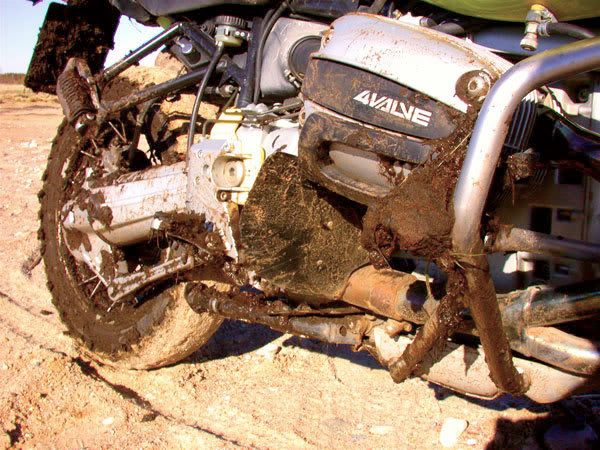
Islands have nice beaches and lot of offroad opportunities:
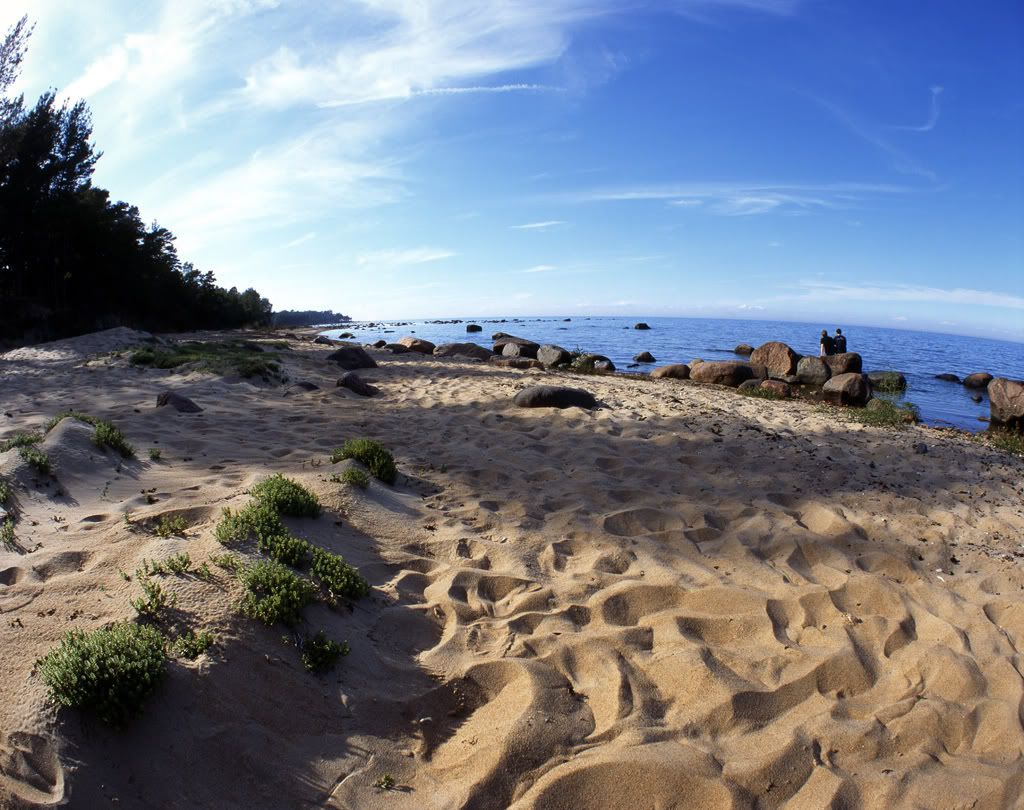
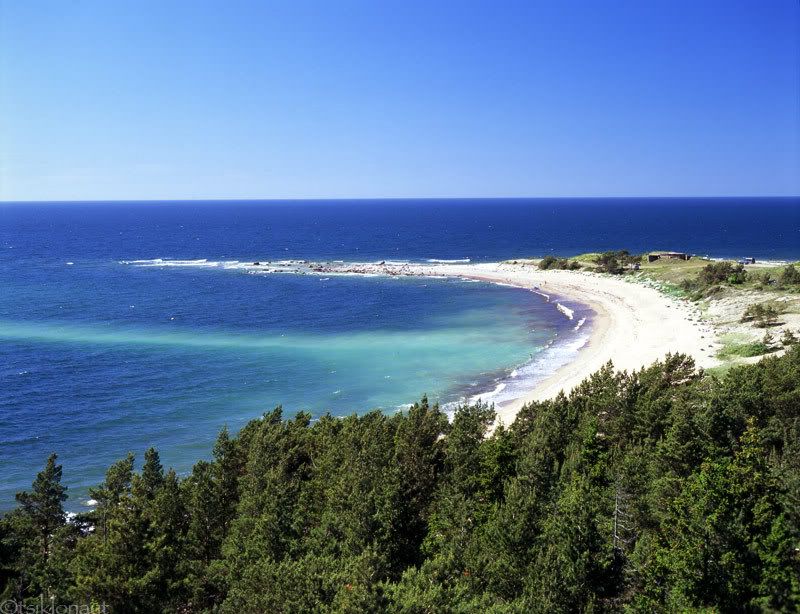
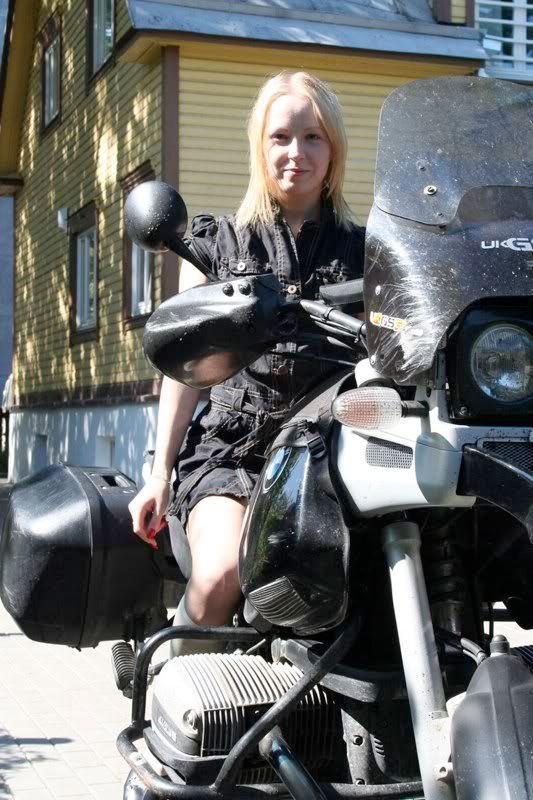
Almost forgot to mention that we have nice girls too who just love big trailies

All right, I've been vain enough with my pics. All yours now.
Cheers, Margus